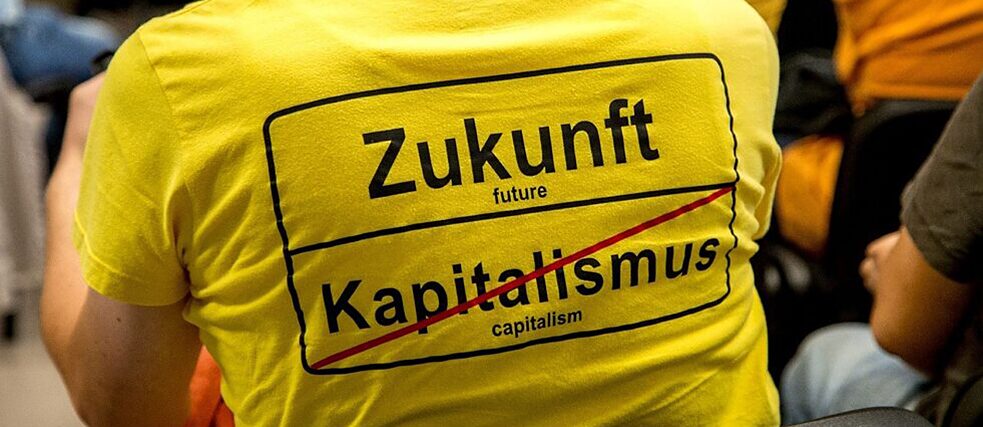Change
The Society of the Future

Photo (detail): © Rosa-Luxemburg-Stiftung
System Change not Climate Change - a well-known adage. But what could it mean?
By Asuka Kähler
Last week Victoria had to deal with living under capitalism while fighting against it. Today we want to look at how the system we live in needs to change.
How Does Change Work?
We as a society are constantly changing. This change is not linear: sometimes it is marginal for decades and even centuries, and at other times it is altogether explosive, whether through technological progress (e.g. industrialisation; the internet) or revolutions, i.e. the rapid and radical change of circumstances (e.g. in France or Haiti). These changes must go hand in hand with changes in people's minds: moral understanding, priority setting and world views. Otherwise, new systems will reproduce the same problems and mistakes as the previous ones, because the basis - the people - still think and act in the same way.In view of the climate crisis and all its facets and consequences, further explosive change is urgently needed which cannot possibly be of a purely technical nature.
“So, do we need a revolution?”
Opinions may be divided on this issue, but it should be clear that far-reaching changes are needed, in the economy, politics, society, and lifestyle.I shall focus on the point that is most often used as an argument as to why more climate protection is not possible: the economy.
The economy has to grow, climate neutrality is too big a burden for it and so on and so forth - the reasons seem to be endless. In a capitalist mindset that takes economic growth as its paradigm, these arguments are valid. But capitalism is incompatible with climate justice, no matter how green it is.
Transforming the Economy
Climate justice also means striving for a society in which identity does not determine (significantly) social position. For the economy, this means a global equalisation of economic strength and living standards and the elimination of exploitative relationships.For this to happen, the free-market principle does not necessarily have to be abolished – something which is often erroneously portrayed as a horror scenario. Only the framework, which is currently characterised by capitalist paradigms (growth, profit and liberalisation) needs to be changed.
What can the change look like?
A strong economy is the key to gaining access to markets worldwide at present when countries with weak economies are dependent on these industrialised countries. This situation needs to be equalised. This would be possible by changing the tariff system: the prevailing course is to liberalise all markets and thus keep tariffs to a minimum. In contrast, tariffs could be defined by the economic strength of a state. States with weaker economic power (measured, for example, by GDP/GDP per capita/distribution of income in society) would be given free access to the markets of wealthier countries. The latter would in turn have to pay higher tariffs to gain access to the weaker markets - the higher the discrepancy in economic power, the higher the tariffs that would have to be paid. This would result in the countries of the global South catching up economically. The consequence would be upheavals in all economic relations - nationally and internationally.
A degrowth economy (i.e. one that is not based on growth) means changes in work, social systems, etc. for the rich countries, so that the local inequality that also exists there does not continue to grow.
In addition to market access, stricter global regulations with massive economic consequences for the violation of human rights, environmental destruction and workers' rights must be laid down, especially so as to put international corporations in their place.
The urgent changes in the economy have far-reaching consequences, of course, but there is no alternative to a change in mentality as well as in society, as described at the outset. Matilde will explain why we activists are needed for this change next week at the end of Blog, Engage, Act!